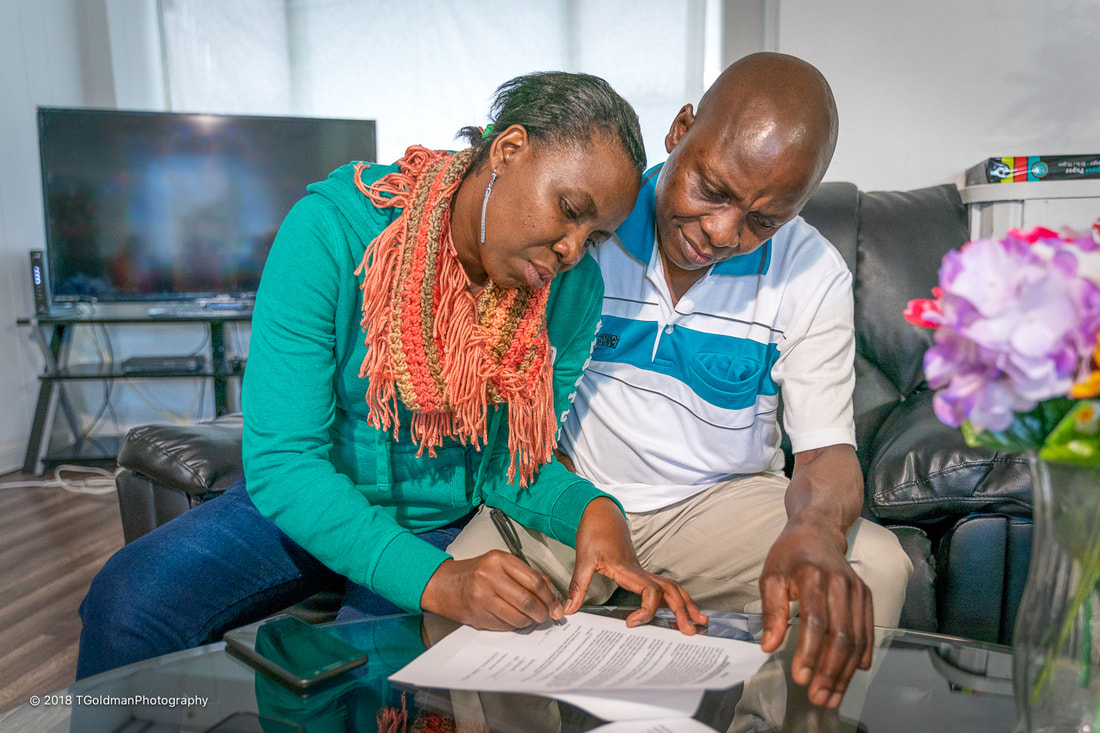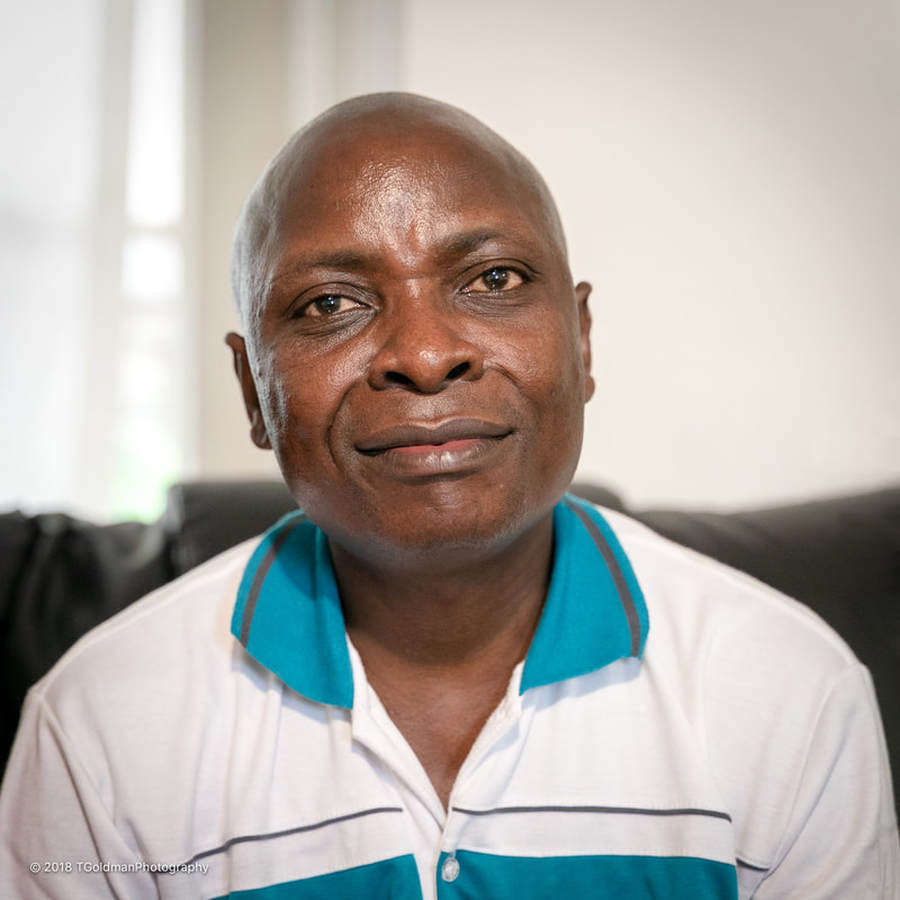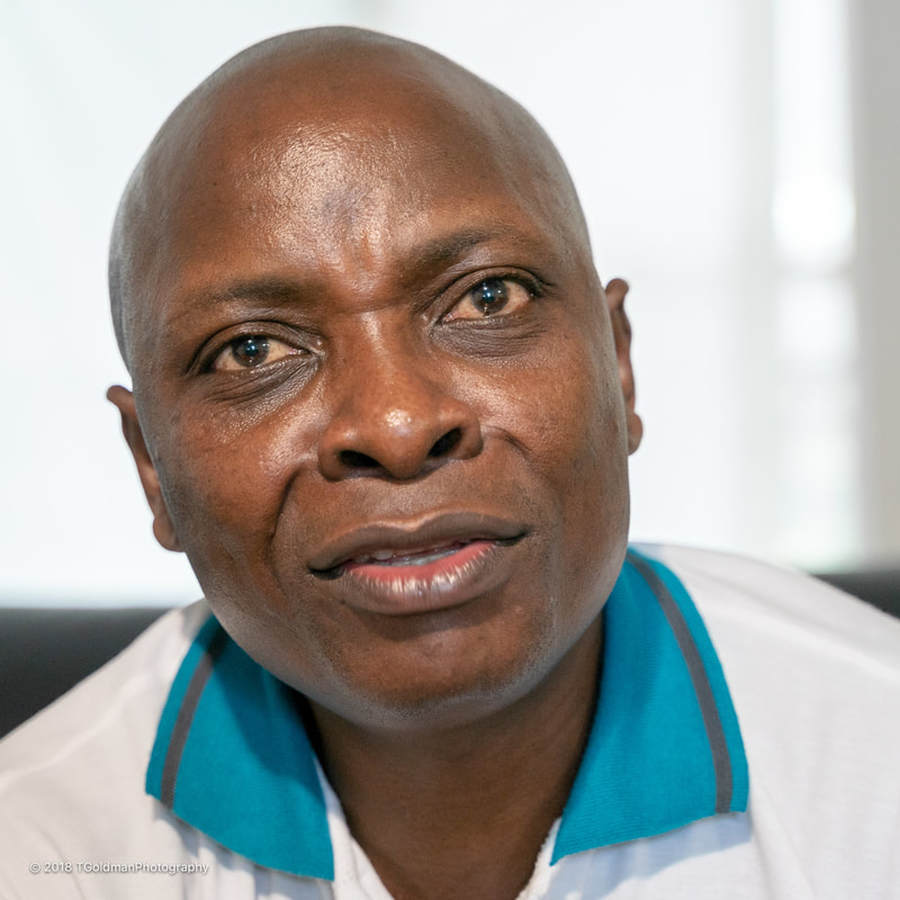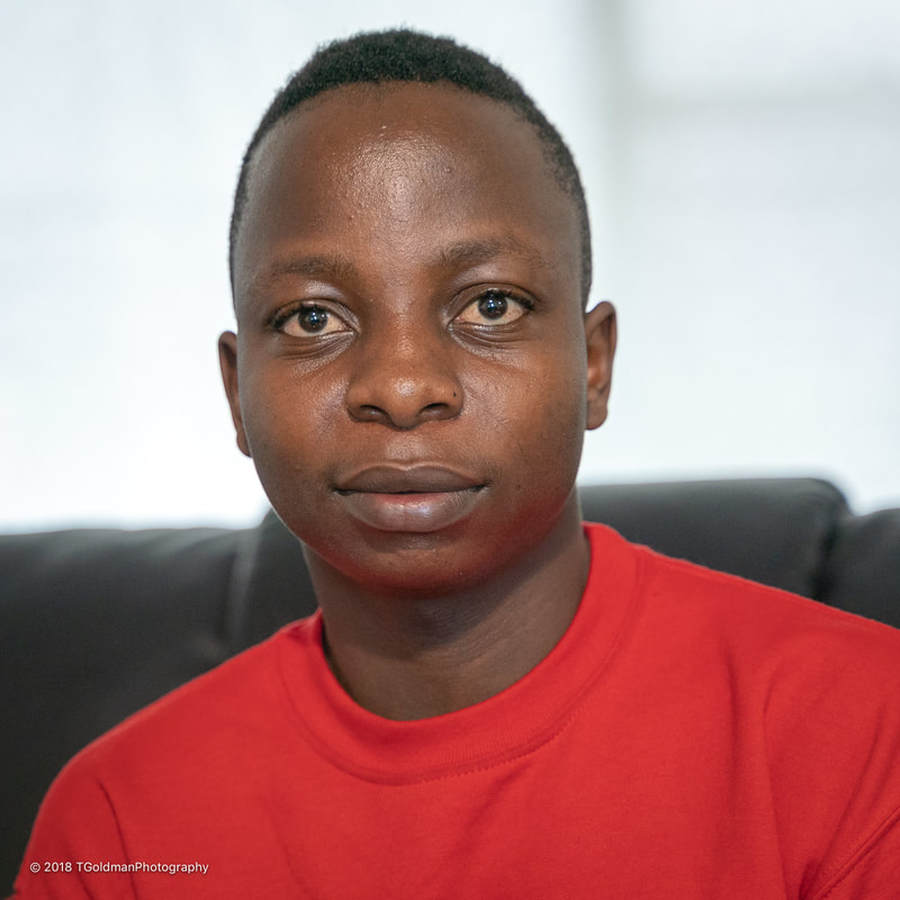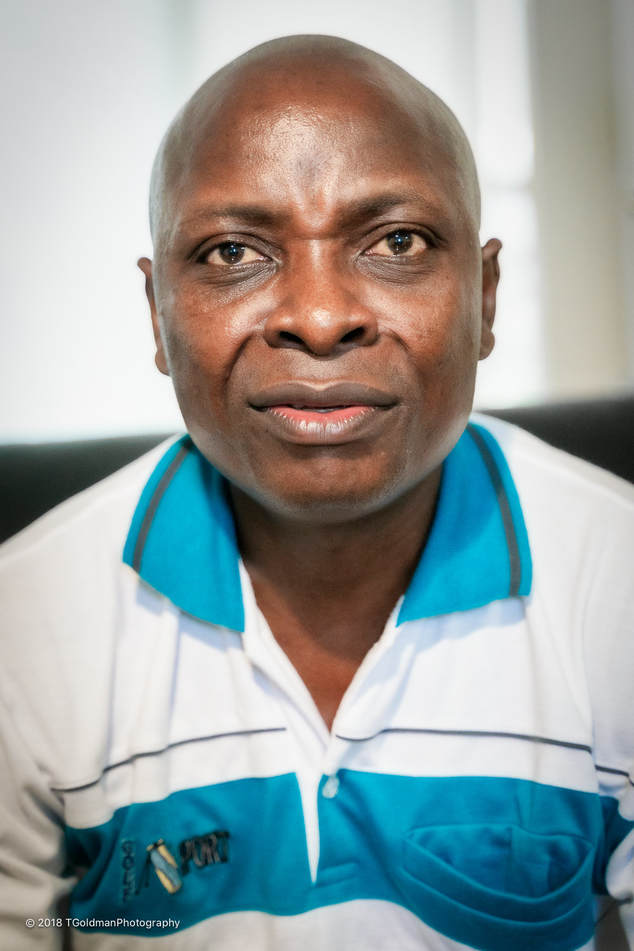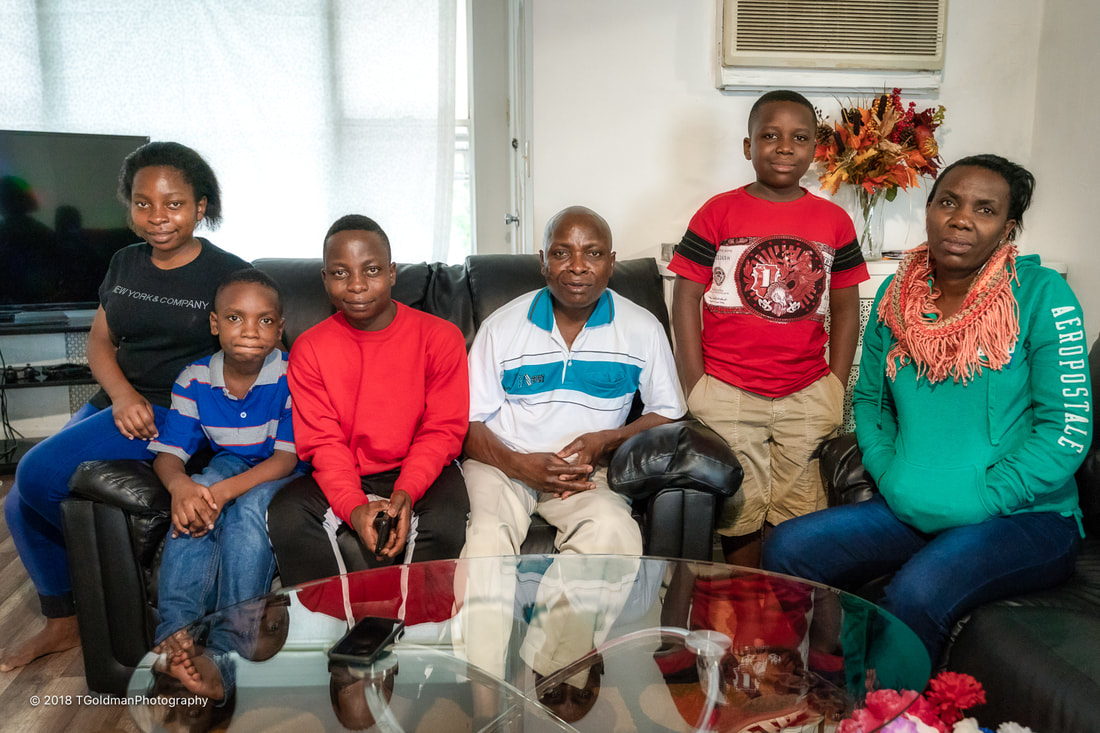Finding The Humanity Of Refugees:
A New Family In The United States
A New Family In The United States
Preface
Before you read this story, please take a moment to look in a mirror… Unless you saw a Native American in your reflection, you or your ancestors are immigrants, refugees, or enslaved Africans. They built this country into the shining star that it is (sometimes but not always). There have been times when these new Americans have been welcomed (whether choosing to come here or being brought against their will). But there are those who feel the welcoming doors should close behind them. Today this virus has erupted into a raging fever against new arrivals fearing that en masse they will rape, murder, and plunder the United States. No rational data supports this false narrative. In fact, the future economic growth of the United States requires an expanding workforce.
The words “immigrant” and “refugee” are very impersonal. They offer no insight into the humanity of the people who are trying to come to the United States either for a better life or to escape persecution. I want to know who these people are as humans- what brings them here, what they leave behind, their hopes, their fears.
Introduction
I've been working with the Nationalities Service Center, NSC, (“Philadelphia’s leading immigrant and refugee service organization empowering individuals to build a self-sustaining and dignified future.”) to meet and interview refugees. In September 2018 I had the privilege of meeting a family of six who were resettled from Rwanda in February 2018. I heard the story of a man who had been persecuted and tortured by his government. After this emotional experience I will never be able to use the generic word “refugee” without thinking about the assault on humanity that stands behind it.
This is the first of several photo essays to find the humanity of refugees. It is about a family new to the United States- their hopes, dreams, and commitments for their new life. Further photo essays will showcase refugees who have been here for longer periods of time to show how their lives have evolved.
Jean-Bosco Ngarama and Family
Jean-Bosco was a teacher, lawyer, and human rights activist in Rwanda. In 2003 as a result of his human rights work, he became an enemy of the state. This began a persecution that would last until he became a refugee and was resettled, along with his family, to the United States fifteen years later. This is the story of a harrowing journey, goals for this family of new Americans, and contributions to the United States.
What’s the difference between a refugee and an immigrant? "Refugee carries a legal definition- it’s a person who is fleeing political persecution, persecution from a social group, war or ethnic conflict; they have no choice but to flee where they live; they become a refugee when they cross a border and seek refugee status with the United Nations- you don’t just become a refugee; you can become someone who is fleeing, but a refugee is someone with a particular status and that comes by registering with the UN where their story is vetted- that’s the legal definition… An immigrant is someone who chooses to come here for a better life; though they may be fleeing, they are not going through the legal process- that’s the distinction." (Margaret O’Sullivan, Executive Director, Nationalities Service Center)
The Interview
It was Sunday morning just after the Ngarama’s returned from church. I nervously knocked on the door of the South Philadelphia row home that had been arranged by the Nationalities Service Center. A young boy opened the door- he didn’t seem to speak English. I entered and Jean-Bosco’s wife Alphonsine approached. She welcomed me into their home with a hug- a universal language everyone understands.
While waiting for Jean-Bosco I looked around to assess the living conditions of these new arrivals. In the living room there were three leather sofas arranged in a “U”- these looked new. In the corner was a large screen TV with cable box. In the dining room two young boys played on a computer. I would understand later how they could have such up to date furnishings in just seven months after arriving.
Jean-Bosco came down stairs and greeted me with his warm smile. We sat in the living room for the interview. It was clear that he wanted to tell his story- he and Alphonsine signed my release without hesitation.
"I left my country because of political issues."
Tell me about Rwanda and why you had to leave: "Thank you so much for that question."
He told his horrid story in a very matter of fact way, often with a smile, never showing anger or hatred towards a country that had inflicted such harm on him, his family, and his fellow citizens. But his experience is indelibly etched upon those eyes- he remembers exact dates and details of experiences that go back fifteen years.
"I left my country because of political issues… I was a human rights activist and from the year 2000 I was a member of a big organization called LIPRODHOR (League for the Promotion and Defense of Human Rights in Rwanda); I reported about violations of human rights done by the military or the government; as an example I monitored the 2003 presidential election and reported that some people were arrested by the military if they didn’t vote for the political party that was in power- some people were beaten… After my report I was arrested by the police and released after two days."
"Three years later in 2006 they took me to court on the same case; in 2007 I was sentenced to three years in jail; I appealed with help from Lawyers Without Borders but the court confirmed the sentence… It was 4 or 5 in the morning on June 16, 2010 that the military came to my door and took me to a barracks where I spent one night; in the morning I was sent to Kigali, the capital, to the Office of Military Intelligence (G2) in the Ministry of Defense; I received torture and then they covered my eyes and put me in handcuffs; I was put in a room with two other people; they gave us military uniforms- my handcuffs were not removed until November 15, five months later!"
"During that time we could only sit down; there was no mattress- we just had a small carpet; there was a small blanket for two people; we had one liter of water per day for washing hands and drinking; we ate beans and corn once per day; we could wash our bodies once per month or two- insects attack people when they don’t wash; they took us to the toilet in the morning and evening… It was more than I can say- it was torture!"
"Human rights people told me: 'If you continue to live in this country they will kill you.'"
Did you know why you were arrested? "It was because of my work on human rights; sometimes when they took us for interrogation we were tortured- they used sticks, electric cables and more… My wife didn’t know where I was for ten months, or if I was alive or dead."
"My family passed an announcement to the BBC (British Broad Casting) to ask the Rwandan government to give them my body if dead or if alive to send me to the court to be judged; because of this announcement, two days later I was sent to the CID (Criminal Intelligence Department) and after three days they took me to a military court where I was charged with endangering the state; they took me to a military prison where they blindfolded me; I was then sent to another barracks for more torture; they put me in a very small room, gave me shorts and a shirt, and gave me a “jerrycan” (a liquid container similar to those designed in Germany in the 1930s for military use to hold five gallons of fuel)- I slept on the floor and used the jerrycan as a toilet; I was treated worse than an animal- it was torture… I stayed in that small room for a week- everything was done in that room; they brought me food and I ate it even though it might be poison- I had no choice."
"After one week they took me to the civil court and the prosecutor charged me with four crimes: 1) Endangering The State- that I threw bombs in the capital; 2) Assassination- I asked who I killed and they said to ask that during judgement; 3) Terrorism- I asked for proof and they said wait; 4) Link With Enemies… After being detained one month I received a letter saying that I would be judged with a group of twenty nine people who were also arrested for endangering the state… With help from Lawyers Without Borders, in January of 2012 the court pronounced that I was innocent and I was released- but I was told that even if I leave prison it doesn’t mean that I didn’t do anything: 'We will be watching you wherever you go!'… Human rights people told me: 'If you continue to live in this country they will kill you.'"
"My case was an emergency because there were spies from Rwanda who kill refugees in Uganda."
How did you leave Rwanda? "After release I went by myself to the neighboring country of Uganda and received asylum… People came to see me from Human Rights Watch and Amnesty International to do interviews- they knew that people were detained and tortured in Rwanda, but they didn’t have enough information; Amnesty International used it in a report: "RWANDA: SHROUDED IN SECRECY: ILLEGAL DETENTION AND TORTURE BY MILITARY INTELLIGENCE;" Human Rights Watch also released a report in 2015 or 2016 which is on-line with my testimony and videos, but my face was hidden."
"Human Rights Watch helped me with the UNHCR (“United Nations High Commissioner for Refugees, also known as the UN Refugee Agency.”) which is how I left from Uganda to the USA- my case was an emergency because there were spies from Rwanda who kill refugees in Uganda… I started the process at the end of 2012 and in 2013 my family joined me."
Jean-Bosco explained that the UNHCR sends letters to all countries about refugees screened for resettlement. He got a letter stating that he and his family would be resettled to the United States. But there are many steps to take before resettlement actually happens: "After that you wait."
When did you first know you were going to the United States? "It was in 2015; I could have come in 2016 but the same day of traveling one of my children was sick so the travel was cancelled and it took until 2018 to get here."
Did you want to go to the United States? "During the screening by the UNHCR they don’t ask which country you want; they don’t ask if you can accept any country;" Did more than one country accept you or was it only the US? "I don’t know, that’s the work of the UNHCR- they only sent me a letter from the United States."
When you learned you were going to the United States, did you think that was good- what did you think about the United States? "I knew many things- it’s a secure country and I was only looking for the security of me and my family- total security- no jail and no torture!"
Most Americans have no idea about being tortured- Americans are free. You are a family that only wanted to go somewhere where you would have security and wouldn’t be tortured- that’s all you wanted? "The first thing we need as human beings is security; the second thing is a job; the third is school for the children."
Did your children understand why you had to leave Rwanda and then go to the United States? "Yes they knew but it’s better to ask them."… He called twenty year old Jean-Yves to come over for some conversation.
"They were after my dad but you can’t get the dad and leave the children; we were all scared."
Before you came to the United States you were almost an adult; did you understand what was happening- that your dad was tortured and Rwanda was trying to kill him? "We just wanted to go somewhere to be safe because there were spies who wanted to take him again."
Were you scared for your personal safety- were they just after your dad or were they after the family? "They were after my dad but you can’t get the dad and leave the children; we were all scared but my younger brothers and sister didn’t know as much as me."
Jean-Yves feels safe in the United States: "People know we’re from Rwanda but they don’t know our story; they treat us nice, especially the Nationalities Service Center- they helped me go to school and next year I’m going to college and after that I want to be a doctor;" Where do you want to go to medical school? "Anywhere!"
"NSC is very good because they helped us get jobs."
Jean-Bosco, how did the Nationalities Service Center help when you reached Philadelphia? "After landing in New York we were driven to the Philadelphia airport where we met our case manager and an interpreter; we were taken to this house- they explained how we use everything like the fridge, the rest room- everything; the following day the case manager took us to the main office where there are many activities and they gave us a schedule for one month; we met the health team and many people; we went there everyday from Monday through Friday- it’s like a school."
"After just three weeks Jean-Yves got a job; in March my wife got a job; in April I got a job… NSC is very good because they helped us get jobs."
You’ve been here for seven months- what do you think of the United States? "The USA is a good country- it’s a safe place, it’s a country free from torture; it’s a country where you can get a job easily- everything is fine in the USA; all of our children are in school; we don’t have a problem with food because we have a job- it’s a good country."… What a perspective when so many Americans are bickering and so polarized. He only sees the good- all he wants is to be safe, have a job, and send his kids to school.
"We didn’t ask to be refugees- it would have been better to stay in our country; we came here because we weren’t safe."
What is your long term hope? "Everyone must plan for their future- I want to see my children finish school and working; I want my own house and my own car- today we use the public bus; for my career, I want to continue my work to help people- once I learn English well enough I want to go to school for healthcare… We want to stay in the USA especially Philadelphia; we are waiting to apply for green cards- NSC calls you after eighteen months to start the process."
Today many Americans don’t want refugees- what would you say to them? "We didn’t ask to be refugees- it would have been better to stay in our country; we came here because we weren’t safe."
How would explain to Americans why they should welcome you and value the contributions you and your family will make to this country as good citizens? "I’m not able to prove how I will be a good citizen, but I can tell you that my first goal is to work hard- when you work you give taxes to the government which means you are building the country with others; we came on February 6, 2018 and three of us were employed within two months- it means that we contributed to the government as soon as we got here and that’s the proof I can give you… When you have a job you can get food and everything for yourself without waiting for assistance from government; if you don’t contribute to tax it gives a bad name to refugees that they are coming to live off of the government."… He said with great pride that the sofas we were sitting on, the big screen TV in the corner, and the computer being used by the children were all purchased with earnings from their jobs.
You and your family are doing very well in the United States, but what did you leave behind in Rwanda? "We have a big family with many uncles and aunts and my first born is in Rwanda- he is from a different mother… It’s difficult to leave your home country but when we came here NSC received us and helped us to know what to do in a new place."
One final question: do you relive the torture you received in Rwanda? "Yes- imagine someone who spent ten months under torture, can you ever forget that?"
We ended with a family portrait of these new Americans, left to right: Aline (18); Bernard (9); Jean-Yves (20); Jean-Bosco (48); Robert (11); Alphonsine (43).
The two hour interview seemed no more than a minute as I was totally transfixed by the Ngarama’s. Jean-Bosco brought into vivid reality what refugee status is all about- people fleeing for their lives. This is not an academic concept- turning a blind eye should not be an option, though it often is.
After taking the family portrait and shaking hands with the children, Jean-Bosco and Alphonsine walked me onto their porch for a few final words. As we chatted, Alphonsine stooped to the floor. I looked down and saw that one of my shoelaces was untied and without a word she was tying it- I literally couldn’t breathe. As she stood I thanked her but didn’t make a big deal out of it, even though it was so big- a tiny act of kindness the likes of which I had never experienced. My goal is to find the humanity of refugees, and in that moment- it found me!
I left thinking that when their plane touched down at JFK airport on February 6, 2018, the shining star of the United States of America burned a little brighter. Their proven strength and resilience will surely bring value to this country, and that is their commitment… We need more Ngarama’s.
*****
I hope this photo essay will help challenge the false narrative about immigrants and refugees that is being promoted in some quarters.
End
Published November 30, 2018

